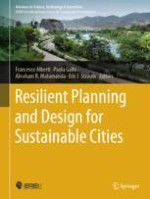2024 | OriginalPaper | Buchkapitel
People Oriented Development: Rethinking the Links Between the Sustainable Development Goals and Transit Oriented Development, Through a Case Study of Quito, Ecuador
verfasst von : Michael Maks Davis, Ersilia Verlinghieri
Erschienen in: Resilient Planning and Design for Sustainable Cities
Verlag: Springer Nature Switzerland
Aktivieren Sie unsere intelligente Suche, um passende Fachinhalte oder Patente zu finden.
Wählen Sie Textabschnitte aus um mit Künstlicher Intelligenz passenden Patente zu finden. powered by
Markieren Sie Textabschnitte, um KI-gestützt weitere passende Inhalte zu finden. powered by
